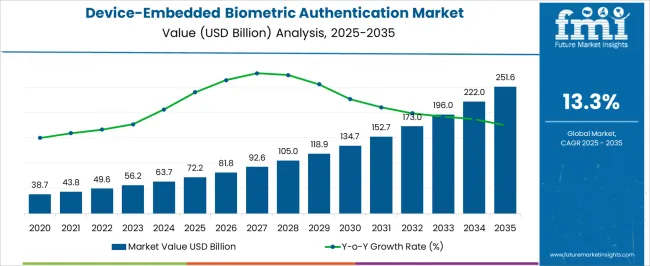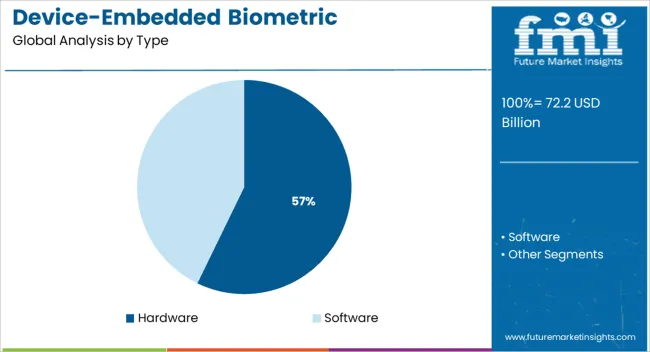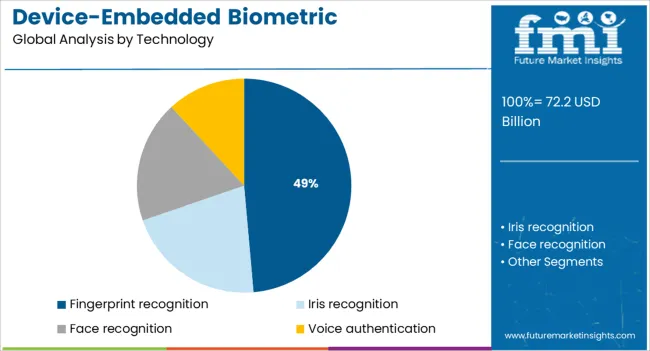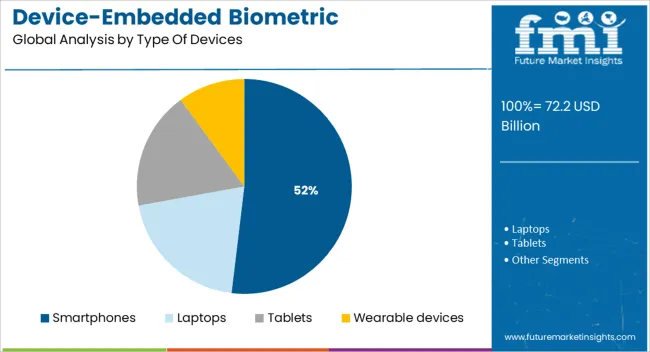The Device-Embedded Biometric Authentication Market is estimated to be valued at USD 72.2 billion in 2025 and is projected to reach USD 251.6 billion by 2035, registering a compound annual growth rate (CAGR) of 13.3% over the forecast period.

| Metric | Value |
|---|---|
| Device-Embedded Biometric Authentication Market Estimated Value in (2025 E) | USD 72.2 billion |
| Device-Embedded Biometric Authentication Market Forecast Value in (2035 F) | USD 251.6 billion |
| Forecast CAGR (2025 to 2035) | 13.3% |
The device embedded biometric authentication market is experiencing robust growth fueled by increasing cybersecurity threats, rising consumer demand for seamless user authentication, and continuous innovation in biometric technologies. As reliance on mobile and connected devices intensifies, the need for integrated security features has become central to product design and user experience.
Biometric authentication offers an efficient alternative to passwords, providing higher levels of accuracy, speed, and convenience. Advancements in sensor technology, edge computing, and AI based identity verification have further strengthened its adoption across consumer electronics and enterprise devices.
Regulatory compliance frameworks and privacy mandates are also encouraging manufacturers to embed secure biometric solutions directly into devices. The market is expected to sustain upward momentum as manufacturers focus on integrating scalable and tamper resistant authentication features across a range of device ecosystems.
The market is segmented by Type, Technology, Type Of Devices, and End-User and region. By Type, the market is divided into Hardware and Software. In terms of Technology, the market is classified into Fingerprint recognition, Iris recognition, Face recognition, and Voice authentication. Based on Type Of Devices, the market is segmented into Smartphones, Laptops, Tablets, and Wearable devices. By End-User, the market is divided into Banking, Financial Services, Insurance (BFSI), E-commerce, Healthcare, Government, and Others. Regionally, the market is classified into North America, Latin America, Western Europe, Eastern Europe, Balkan & Baltic Countries, Russia & Belarus, Central Asia, East Asia, South Asia & Pacific, and the Middle East & Africa.

The hardware segment is projected to account for 57.20%t of the total market revenue by 2025, making it the leading category within the type classification. This dominance is driven by the critical role of embedded physical components such as biometric sensors, chips, and modules that enable secure identity verification.
Hardware based authentication offers higher levels of accuracy and protection against spoofing and tampering compared to software only alternatives. The embedded nature of the components ensures seamless integration into consumer and industrial devices while maintaining a compact form factor.
Growing demand for tamper proof and on device processing solutions has further reinforced reliance on dedicated biometric hardware. As security becomes a core feature in product innovation, the hardware segment is expected to remain at the forefront of market leadership.

Fingerprint recognition is expected to contribute 48.60% of the overall market revenue by 2025 under the technology category, making it the most widely adopted biometric modality. Its prominence is supported by a balance of affordability, maturity, and user convenience.
Compact sensor designs have enabled easy integration into a wide range of devices including smartphones, tablets, laptops, and access control systems. Technological advancements have enhanced accuracy and reduced latency, making fingerprint recognition suitable for both consumer and enterprise applications.
The method’s non intrusive nature and compatibility with existing device interfaces have strengthened its preference. As biometric security continues to gain traction across industries, fingerprint recognition remains a trusted and scalable solution for embedded authentication.

The smartphones category is anticipated to capture 51.90% of market revenue by 2025 within the type of devices classification, leading the adoption of embedded biometric authentication. This dominance is driven by the rapid proliferation of smartphones globally and consumer expectation for secure and frictionless access to devices and applications.
Biometric features such as fingerprint and facial recognition have become standard in modern smartphones, enhancing both device security and user experience. Manufacturers are increasingly embedding advanced biometric sensors under displays or on device surfaces, minimizing design disruption while ensuring robust authentication.
Integration of biometric authentication for mobile banking, digital identity, and payment validation has further amplified its role. As smartphones continue to serve as primary computing and communication tools, their role in advancing biometric adoption remains central to market growth.
It is identified that the device-embedded biometric authentication market has been witnessing robust growth in demand in the recent few years. There has been an approximate rise of USD 5,824.57 million in market valuation from the base year to the current year.
The surge in market shares of device-embedded biometric authentication systems can be attributed to the increasing need of diverse organizations to ensure that their data is safe. The device-embedded biometric authentication systems are cost-effective. The need for organizations to register quickly and securely is a key factor propelling the growth of the market. The ease of employee identification at the office is fueling the adoption of these systems in 2025.
Furthermore, device-embedded biometric authentication systems enable easy access and control from mobiles, record time, and make management of the workplace easier for budding business organizations. Advancements in cloud computing technologies and the rise in storage capacities of clouds for device-embedded biometric authentication systems are expected to flourish market growth through 2035.
Although the market has favorable growth, small industries are unable to adopt these systems due to the high initial costs involved. Additionally, the lack of skilled personnel for the management of these systems is also estimated to curb the market growth during the period 2025 to 2035.
The key players in the device-embedded biometric authentication market are leveraging technological advancements to launch new products and gain a competitive advantage. These firms are continually investing in research and development activities to keep themselves in tandem with the changing consumer preferences and end-use industry demands. Efforts are being made to strengthen their foothold in the forum and aid the further progression of the device-embedded biometric authentication market.
Manufacturers are deploying advanced technologies like AI-based biometric behavioral detection for transaction monitoring. It provides Account Opening Protection for identifying digital behaviors, Account Takeover Protection for detecting behavioral anomalies, Social Engineering Scam Detection for identifying fraudulent behavior on money transfers, and more. Users can integrate the tools with websites and mobile-based platforms. Therefore, it is anticipated that the market is likely to witness significant growth through the projection period.
The growing trend towards a secure and convenient way of authentication of devices is the key factor that triggers the growth of the global device-embedded biometric authentication market. Device-embedded biometric authentication is defined as the use of a biometric authentication method to enhance the security and accessibility of devices, such as smartphones, tablets, notebook PCs, and wearable devices.
Devices enabled with biometric authentication are embedded with the necessary hardware and software for authentication. Based on the application, various types of biometric authentication can be deployed, such as face, iris, voice and fingerprint authentication.
Increasing need for effective personal authentication in wide range applications such as ID verification, access control, electronic commerce are the factors contributes the healthy growth rate of global device-embedded biometric authentication market.
Additionally, rising interest on deploying biometric authentication for verifying individual identity of users seeking access to various virtual asserts and increasing adoption mobile payment applications, accelerates the growth of device-embedded biometric authentication market globally.
Also, increasing smartphone sales, growing telecommunication infrastructure and growing preference for automated identity authentication solutions across various platforms, further fuels the growth of global device-embedded biometric authentication market. However, high initial cost and technical concerns related to compatibility with existing system are the key factors likely to deter the progression of global device-embedded biometric authentication market.
North America followed by Western Europe is expected to dominate the market due to continuous investment to deploy new technologies and high customer preference to enhanced security solutions. Asia pacific is identified as the fastest growing market due to increasing number of smartphone users and rapid adaptation to mobile banking applications.
The key vendors in the Global Device-Embedded Biometric Authentication Market, include HID Global, IDEX America, Inc., Gemalto NV, ImageWare Systems., FUJITSU, Fingerprint Cards AB, Techshino Technology, Apple Inc., Nuance Communications, Inc., and ArmorVox.
The report is a compilation of first-hand information, qualitative and quantitative assessment by industry analysts, inputs from industry experts and industry participants across the value chain.
The report provides in-depth analysis of parent market trends, macro-economic indicators and governing factors along with market attractiveness as per segments. The report also maps the qualitative impact of various market factors on market segments and geographies.
The global device-embedded biometric authentication market is estimated to be valued at USD 72.2 billion in 2025.
The market size for the device-embedded biometric authentication market is projected to reach USD 251.6 billion by 2035.
The device-embedded biometric authentication market is expected to grow at a 13.3% CAGR between 2025 and 2035.
The key product types in device-embedded biometric authentication market are hardware and software.
In terms of technology, fingerprint recognition segment to command 48.6% share in the device-embedded biometric authentication market in 2025.






Full Research Suite comprises of:
Market outlook & trends analysis
Interviews & case studies
Strategic recommendations
Vendor profiles & capabilities analysis
5-year forecasts
8 regions and 60+ country-level data splits
Market segment data splits
12 months of continuous data updates
DELIVERED AS:
PDF EXCEL ONLINE
Biometric Vehicle Access Market Size and Share Forecast Outlook 2025 to 2035
Biometric Payment Cards Market Size and Share Forecast Outlook 2025 to 2035
Biometric PoS Terminals Market by Technology, End-Use, and Region - Growth, Trends, and Forecast through 2025 to 2035
Biometric Driver Identification System Market Growth - Trends & Forecast 2025 to 2035
Biometric Sensors Market Trends – Growth & Forecast 2025 to 2035
Biometric-as-a-Service Market Forecast 2025 to 2035
Biometric Lockers Market
Military Biometrics Market Size and Share Forecast Outlook 2025 to 2035
Behavioral Biometrics Market Size and Share Forecast Outlook 2025 to 2035
Healthcare Biometrics Market Trends - Growth, Demand & Forecast 2025 to 2035
AI-enabled Biometrics Market
Multi-Modal Biometric Cabin Sensors Market Analysis - Size, Share, and Forecast Outlook 2025 to 2035
Contactless Biometric Technology Market by Technology, Component, Application & Region Forecast till 2035
Fingerprint Biometrics Market by Authentication Type, Mobility, Industry & Region Forecast till 2035
Hand Geometry Biometrics Market Insights - Trends & Growth 2025 to 2035
Authentication and Brand Protection Market Size and Share Forecast Outlook 2025 to 2035
Authentication Solution Market Analysis - Size, Share, and Forecast Outlook 2025 to 2035
Market Share Breakdown of Authentication Solutions Manufacturers
FIDO Authentication Market Analysis - Size, Share, and Forecast 2025 to 2035
Cloud Authentication Market Size and Share Forecast Outlook 2025 to 2035

Thank you!
You will receive an email from our Business Development Manager. Please be sure to check your SPAM/JUNK folder too.
Chat With
MaRIA